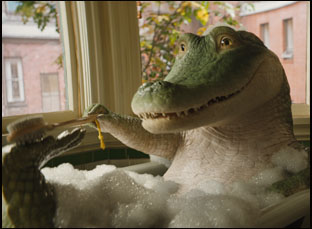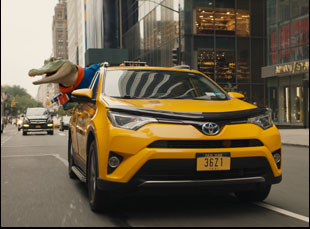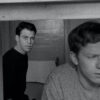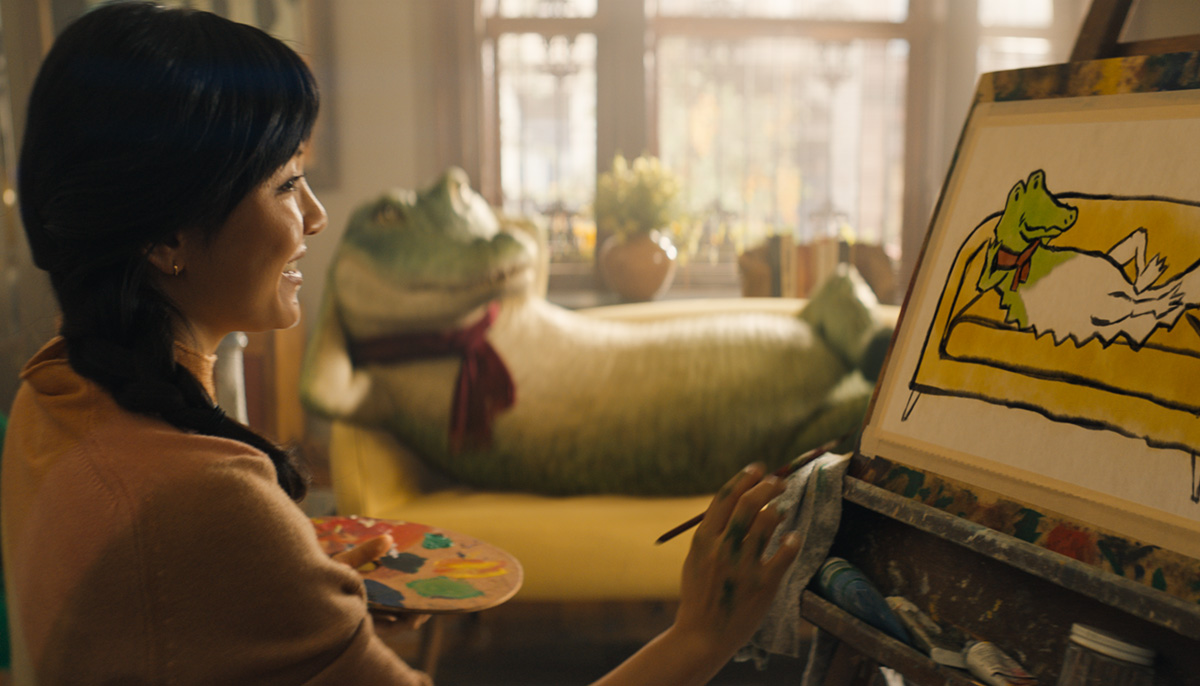When “Blades of Glory” came out towards the end of Will Ferrell’s run of sports-themed comedies in the 2000s, it would end up surprising a lot of people, not the least of which were its first-time feature directors Will Speck and Josh Gordon. The directing duo may not have been as taken aback as others by the originality of ice skating satire or how they were able to keep all its wild elements on track, but years later they would come to realize that working with choreographers on elaborate routines and realizing how much they could get away with in terms of earnest emotions amidst the flashy costumes and larger-than-life characters had prepared them well for tackling their first proper musical, feeling as though they already had one under their belt. Still, as anyone that has followed their career knows, the two have had little interest in repeating themselves.
“What we are trying to do is continue to try and challenge ourselves and do things that feel new and out of our comfort zone,” Speck said on the eve of their most ambitious film to date with “Lyle, Lyle Crocodile,” a big, boisterous adaptation of Bernard Waber’s beloved children’s book, complete with songs from “The Greatest Showman” tunesmiths Benj Pasek and Justin Paul, that at once feels a piece of their filmography and the film they’ve been working towards their whole careers.
Although Speck and Gordon have been no doubt sought after for their sharp comic instincts, their ability to build worlds elastic enough to accommodate outrageous set-pieces and real gravitas has been equally impressive. (Even in “The Switch,” their subdued follow-up to “Blades of Glory,” they flipped the script with the Jason Bateman-Jennifer Aniston comedy when its far-fetched premise of a stolen sperm sample was right at home in the melancholy reality the filmmakers created.) In “Lyle, Lyle Crocodile,” the filmmakers delight with the singing and dancing Lyle (given voice by Shawn Mendes), who cannot bring himself to express himself any other way and not even able to say “no” to the entreaties of Hector P. Valenti (Javier Bardem), a two-bit entertainer that believes he can make up for what he lacks in talent himself with an exotic animal by his side. Lyle’s stage fright prevents Hector from seeing the big bucks, forcing him to go out on the road to hustle for cash while Lyle stays behind in the attic of the brownstone Hector has taken shelter in for years, left to his own devices until the Primm family moves into abandoned home where their young son Josh (Winslow Fegley) finds a desperately needed friend when acclimating to his new surroundings doesn’t come easily.
Despite the demands of a feature with a CG character at its center and a run time that requires more plotting than the original 48-page picture book entailed, Speck and Gordon admirably let any embellishments of their own making serve the simplicity and the direct emotional pull that made Waber’s text an enduring classic as Lyle goes from a secret that Josh and his parents (Constance Wu and Scoot McNair) feel they must hide from the world, particularly their curmudgeonly landlord (Brett Gelman), to giving him confidence and celebrating his unique talent. With “Lyle, Lyle Crocodile” arriving in theaters this week, the directors spoke about the latest turn in their unpredictable career, keeping the chemistry on set up to their usual high standards even when one of the characters was largely virtual and adding music to their creative quiver.

Josh Gordon: We always loved the book. We both grew up on it and we both had kids and we were talking to each other about things that we always loved and things that we wanted to do next and we’ve wanted to do a musical for a long time. The combination of all of those led us to this book, to this moment, and to securing the rights. One thing led to another and we’re thrilled that we did it.
You make it sound so easy, which musicals typically aren’t, and you actually turned this around in just a little over a year. What’s the secret?
Will Speck: You’re right, musicals usually take a very long time, but this was one of the fastest movies that we’ve made from conceiving it to actually being finished with it, and the advantage here was Pasek and Paul, who are composers/lyricists are really firing on all cylinders right now. They came in during the development of the script, which was really important because musicals operate a little bit differently than a normal narrative script in that a single musical number which can last a couple of minutes can move a character forward in their evolution more than sometimes 10 or 15 pages of a regular script, so it was great to have them come in and really help us structure the movie.
Then we worked on the script for a while with Will Davies, an incredibly talented writer who [wrote] a series of movies called “How to Train Your Dragon,” which we had always loved, so we always had an incredible bench of talent working with us on the evolution of this story. And Pasek and Paul are really quite fast in their ability to write incredible new music, so while we were building the movie and building the sequences, they were already starting to write these incredible songs. That’s really what allowed us to get it completed in this time frame.
From what I understand, you really embraced the fact that Lyle would only express himself in music, but did that make this a tougher nut to crack or did it open things up for you?
Josh Gordon: It’s a little bit of both. In some ways, the limitation was hard because I think it was a lot easier to let Lyle speak, but we wanted to give the audience what the family gets, which is a vessel to communicate in a way that’s deeper and more emotional. It also allowed us to be more specific and targeted about where and how Lyle sang and what the reason was behind that.

Will Speck: On set, we hired a stand-in to be Lyle in those scenes and he wore a prosthetic head and had a big tail so physically he could move around the set, especially in things like dance sequences where we had a dance double with the actors so they could all interact with them. What gave us was the ability to film the scenes like a real scene and have the actors, especially the younger actors, be able to interact with an actual performer and the scenes had a pace to them and felt real. But then we were able to work with Shawn Mendes in the booth while he recorded his music and we taped him so that the animators could really base the performance of Lyle on Shawn’s mannerisms and on his facial performance, so we really got the best of both worlds, which was a physically real feeling performance on set, but then capturing the magic of Shawn’s acting.
It seems like you might’ve been excited by the possibilities of being able to place a camera anywhere in the frame when there’s such energy to how it is able to move through space and often is positioned in such unexpected angles. Was that an interesting part of the process?
Will Speck: Yeah, a friend of ours who had made several musicals before told us, “You have to make the movie before you make the movie,” so we did an enormous amount of planning, starting with rehearsals and then actually used previsualization to really plan a lot of these sequences to the point where we had to build the sets to accommodate how our cameras would move through walls or move through the set. That really lifted the cinematic quality of the movie and allowed us to really make these sequences, especially the musical numbers, really exciting visually.

Josh Gordon: We both were born in New York and we both went to NYU Film School, so New York is just such an important city for us and an iconic character in the book and in the movie, so we wanted to create a kind of slightly fable-ish version of New York. We’re lucky to get to shoot here a lot, and we also got to build some of the biggest stages in Atlanta as well — the brownstone and the street in front was mainly a massive set that we built — so we were able to come up and shoot in New York for a while and it’s just always about which New York do you shoot? We wanted it to feel real, but we also wanted it to honor the character of the original book, so we shot a lot uptown, we shot a lot on the Upper West and East side, which is always an incredible experience, shooting here.
Will Speck: It was thrilling, honestly. We knew, especially as organic as we wanted the process to be, the end game was going to be so visual, so setting it in New York City just felt like another level.
The score also becomes quite majestic when you’ve got these full orchestras at your fingertips. What was it like to put music on this?
Josh Gordon: Nothing is quite as effective as a great musical number. You know, it’s up there with a great boxing or racing movie. It’s one of those things that on film gets the audience going, so for Will and I, it was super exciting to be able to do our first full musical. And especially when you’re working with people like Pasek and Paul, who bring with them an entire incredible team of people who are really bringing back the art of the musical, which has had its ebbs and flows over the years and had slightly gone away. Really, they’re very instrumental in bringing it back to this new generation, so it was thrilling and we got to work on some of the biggest stages at Sony with huge orchestras and great mixers. When you feel it building and coming alive, it’s like a secret weapon that keeps being added to your movie. The first time you see a finished number with a finished produced track, it’s thrilling as a filmmaker.




